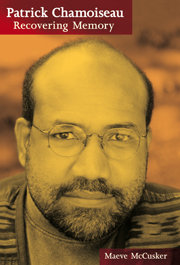Book contents
- Frontmatter
- Contents
- Acknowledgements
- Abbreviations
- Introduction
- 1 Beginnings: The Enigma of Origin
- 2 ‘Une tracée de survie’: Autobiographical Memory
- 3 Memory Re-collected: Witnesses and Words
- 4 Memory Materialized: Traces of the Past
- 5 Flesh Made Word: Traumatic Memory in Biblique des derniers gestes
- Afterword
- Notes
- Bibliography
- Index
4 - Memory Materialized: Traces of the Past
- Frontmatter
- Contents
- Acknowledgements
- Abbreviations
- Introduction
- 1 Beginnings: The Enigma of Origin
- 2 ‘Une tracée de survie’: Autobiographical Memory
- 3 Memory Re-collected: Witnesses and Words
- 4 Memory Materialized: Traces of the Past
- 5 Flesh Made Word: Traumatic Memory in Biblique des derniers gestes
- Afterword
- Notes
- Bibliography
- Index
Summary
Memory is at once an innate capacity, and an intangible ‘store’ of past experiences, sensations, abilities and events. But as recent studies of memory have repeatedly underlined, it is mediated through and stimulated by things: sites, monuments or archives in the public domain, and paraphernalia, possessions or souvenirs in the personal sphere. In his highly critical study of the prevalence of memory as an explicit theme in recent writing, Kerwin Klein argues that contemporary memory is frequently vested in ‘a dramatically imperfect piece of material culture, and such fragments are best if imbued with pathos’. These memorial tropes, he argues, have emerged as one of the common features of our new cultural history, in which, time and again, ‘readers confront the abject object; photographs are torn, mementos faded, toys broken’. Whatever the validity of Klein's polemical analysis – and I have discussed some of its limitations in the Introduction – it is undeniable that the items of material culture which he discusses are remarkable for their absence in Chamoiseau's work, which is largely devoid of the ‘stuff’ of life: furniture, toys, presents, objects, clothes. This absence cannot be seen, moreover, as a simple reflection of the non-Western, non-materialistic culture which his works describe; indeed, such a description of Martinican society is in any case questionable.
- Type
- Chapter
- Information
- Patrick ChamoiseauRecovering Memory, pp. 101 - 126Publisher: Liverpool University PressPrint publication year: 2011



